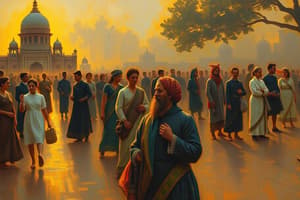Podcast
Questions and Answers
What was modern nationalism in Europe associated with?
What was modern nationalism in Europe associated with?
- Formation of nation-states (correct)
- Decline of imperialism
- Rise of monarchies
- Formation of empires
What was a shared bond that tied many different groups together in the Indian anti-colonial movement?
What was a shared bond that tied many different groups together in the Indian anti-colonial movement?
- The sense of being oppressed under colonialism (correct)
- The desire for economic growth
- The need for social reform
- The dream of independence
What was the impact of the war on the Indian economy?
What was the impact of the war on the Indian economy?
- It had no impact on the economy
- It led to a huge increase in defence expenditure (correct)
- It led to a reduction in taxes
- It led to a decrease in defence expenditure
What was the result of forced recruitment in rural areas?
What was the result of forced recruitment in rural areas?
Who led the Congress in trying to forge different groups together within one movement?
Who led the Congress in trying to forge different groups together within one movement?
What movement is the chapter going to explore after picking up the story from the 1920s?
What movement is the chapter going to explore after picking up the story from the 1920s?
What happened to prices between 1913 and 1918?
What happened to prices between 1913 and 1918?
What was the impact of the famines and the epidemic on the population?
What was the impact of the famines and the epidemic on the population?
What became a common feature during the national movement in India?
What became a common feature during the national movement in India?
Where did Mahatma Gandhi successfully fight against the racist regime?
Where did Mahatma Gandhi successfully fight against the racist regime?
What was the period during which the national movement in India spread to new areas, incorporating new social groups, and developing new modes of struggle?
What was the period during which the national movement in India spread to new areas, incorporating new social groups, and developing new modes of struggle?
What was the context in which the growth of modern nationalism in India is intimately connected?
What was the context in which the growth of modern nationalism in India is intimately connected?
What is the principle of satyagraha?
What is the principle of satyagraha?
What was the consequence of the varied experiences and notions of freedom among different classes and groups in India?
What was the consequence of the varied experiences and notions of freedom among different classes and groups in India?
What was the result of the crop failures in 1918-19 and 1920-21?
What was the result of the crop failures in 1918-19 and 1920-21?
What was the method of mass agitation used by Mahatma Gandhi?
What was the method of mass agitation used by Mahatma Gandhi?
Flashcards are hidden until you start studying
Study Notes
Nationalism in India
- Nationalism in India emerged as a response to colonialism, with the anti-colonial movement playing a significant role in shaping the national identity.
- The Congress, led by Mahatma Gandhi, sought to unite different social groups within one movement, but this unity was not without conflict.
The Non-Cooperation and Civil Disobedience Movements
- The movements took place in the 1920s, with mass processions on the streets becoming a common feature.
- The national movement during this period spread to new areas, incorporated new social groups, and developed new modes of struggle.
The First World War and Its Impact
- The war led to a huge increase in defence expenditure, financed by war loans and increasing taxes, customs duties, and income tax.
- Prices doubled between 1913 and 1918, leading to extreme hardship for the common people.
- Villages were forced to supply soldiers, leading to widespread anger, and crops failed in many parts of India, resulting in acute shortages of food.
- An influenza epidemic accompanied the food shortages, resulting in the death of 12 to 13 million people, according to the census of 1921.
Mahatma Gandhi and the Idea of Satyagraha
- Mahatma Gandhi returned to India in January 1915, bringing with him the concept of satyagraha, developed during his time in South Africa.
- Satyagraha emphasized the power of truth and the need to search for truth, suggesting that physical force was not necessary to fight the oppressor.
- This novel method of mass agitation involved appealing to the oppressor through non-violent means, seeking to win the battle without vengeance or aggression.
Studying That Suits You
Use AI to generate personalized quizzes and flashcards to suit your learning preferences.



